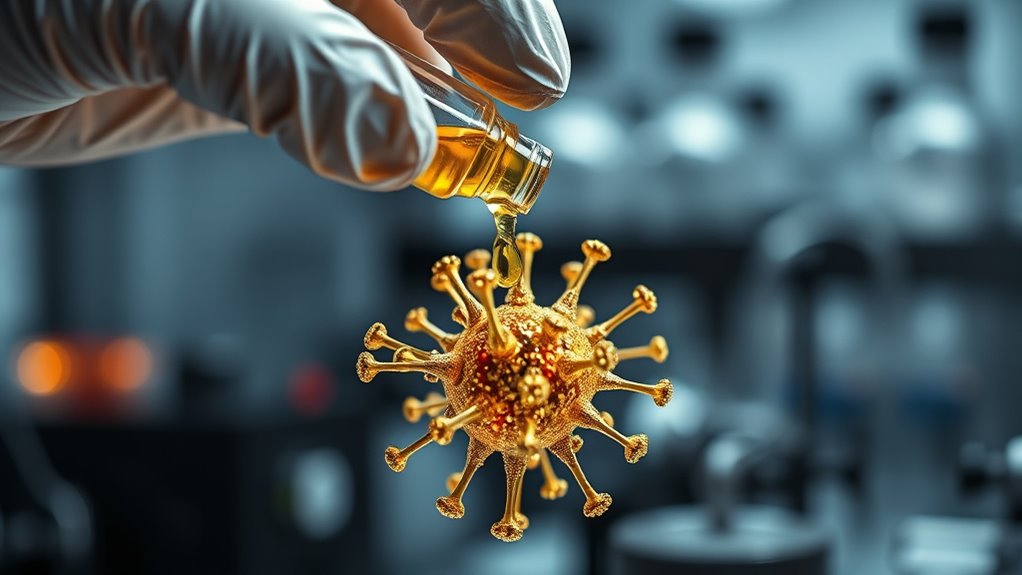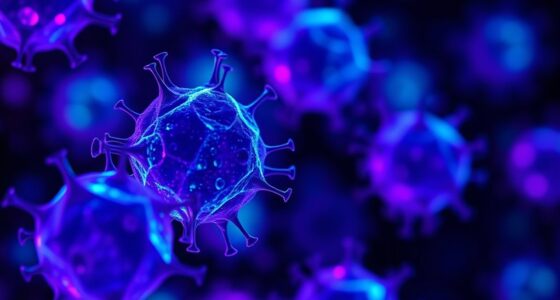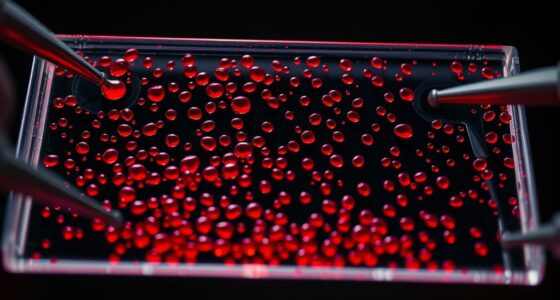While complete elimination of allergies remains challenging, advances in allergen neutralization show promise. Using chemistry, scientists design treatments that block allergens from binding to your immune cells, reducing symptoms. Immunotherapy gradually retrains your immune system to tolerate allergens better. New developments like targeted biologics and improved testing aim to make allergies more manageable. If you’re curious about how these scientific breakthroughs work, there’s much more to explore about the chemistry behind allergy treatments.
Key Takeaways
- Allergen immunotherapy retrains the immune system, reducing hypersensitivity but doesn’t completely eliminate allergies.
- Allergy treatments, such as antihistamines and monoclonal antibodies, neutralize specific allergic reactions without eradicating allergens.
- Advances in understanding immune chemistry enable targeted allergy management but full elimination remains challenging.
- Ongoing research aims to improve allergen neutralization strategies, potentially reducing allergy severity over time.
- Complete allergy elimination is currently unlikely; focus remains on controlling symptoms and modifying immune responses.

Have you ever wondered how allergy treatments reduce your symptoms? The answer lies in understanding how your immune response reacts to allergens and how medical techniques like allergy testing help identify these triggers.
When you encounter an allergen—such as pollen, pet dander, or dust mites—your immune system perceives it as a threat. In response, it triggers an immune response, releasing chemicals like histamine that cause symptoms such as sneezing, itching, or congestion. This hypersensitive reaction is often influenced by genetic and environmental factors that affect immune system regulation.
Allergy testing plays a essential role in pinpointing exactly what your immune system overreacts to, allowing healthcare providers to develop targeted treatment plans. These tests expose you to small amounts of potential allergens to observe your immune response, helping identify sensitivities precisely and safely.
Allergy testing helps identify specific triggers safely, enabling targeted and effective treatment plans.
Once your allergen sensitivities are identified through allergy testing, treatments aim to modify your immune response. One common approach is allergen immunotherapy, which involves gradually introducing small, controlled doses of the allergen to your body.
Over time, this process helps your immune system become less reactive, reducing the severity of symptoms. Basically, you’re retraining your immune response to recognize the allergen as harmless.
This process leverages the body’s natural ability to adapt, gradually shifting the immune system’s behavior from hypersensitive to tolerant. The goal isn’t to eliminate the allergen entirely but to neutralize the immune response, diminishing the chemicals released and the symptoms they cause.
In allergen neutralization, understanding the chemistry behind immune responses is fundamental. Scientists develop formulations that either block the allergen from binding to immune cells or interfere with the signaling pathways that lead to allergic reactions.
For instance, antihistamines work by blocking histamine receptors, preventing allergic symptoms from manifesting. More advanced treatments, like monoclonal antibodies, target specific molecules involved in the immune response, effectively dampening or neutralizing the reaction.
These approaches aim to strike a balance—reducing allergy symptoms without compromising your immune system’s ability to fight actual threats. Additionally, ongoing research into molecular mechanisms continues to provide new insights into allergen neutralization strategies. Understanding immune modulation techniques is also crucial for developing personalized treatments.
While completely eliminating allergies remains a challenge, ongoing research continues to improve how we neutralize allergens and modify immune responses. The key is understanding the chemistry behind these reactions and harnessing that knowledge to develop more effective, personalized treatments.
With advancements in allergy testing and immunotherapy, you’re better equipped than ever to manage your allergies and improve your quality of life. Although total elimination may still be on the horizon, controlling and neutralizing allergens through innovative medical strategies is steadily becoming more achievable.
Frequently Asked Questions
Are There Natural Remedies Effective Against Allergies?
You might wonder if natural remedies work against allergies. Herbal remedies like butterbur or stinging nettle can provide relief by reducing inflammation and histamine responses.
Dietary adjustments, such as avoiding known allergens and incorporating anti-inflammatory foods like turmeric and ginger, may also help manage symptoms.
While these remedies can support your immune system, it’s best to consult a healthcare professional for personalized advice and verify safety with any natural approach.
How Long Does Allergen Neutralization Treatment Last?
Think of allergen neutralization treatment as a marathon, not a sprint. Its duration effectiveness varies based on your immune response and treatment type.
Generally, treatment longevity can last from several months to a few years, but maintenance might be needed to keep symptoms at bay.
To maximize benefits, follow your healthcare provider’s advice closely and stay consistent, as this helps guarantee your allergy relief persists longer.
Can Allergy Vaccines Provide Permanent Relief?
Allergy vaccines can provide long-lasting relief, but they may not be permanent for everyone. Your genetic predisposition and environmental factors influence how well the treatment works over time.
While many people experience significant symptom reduction, ongoing exposure to allergens or changes in your environment might require booster shots or additional treatments.
Discuss your specific situation with an allergist to determine the best plan for lasting relief.
Is It Possible to Prevent Allergies Before They Develop?
Is it possible to prevent allergies before they develop? You might wonder if early interventions could help.
While genetic predisposition and environmental triggers play essential roles, you can reduce risk by limiting exposure to common allergens and maintaining a healthy immune system.
Though no foolproof method exists yet, staying aware of environmental triggers and adopting preventive strategies could lower your chances of developing allergies in the future.
Are There Potential Risks With Allergen Neutralization Therapies?
You should be aware that allergen neutralization therapies may carry potential risks, such as immune suppression, which could weaken your immune response.
Additionally, allergen modification techniques might cause unintended reactions or sensitivities.
While these therapies aim to reduce allergy symptoms, it’s important to take into account these risks and consult your healthcare provider to weigh the benefits against possible adverse effects.
Conclusion
While allergies seem unstoppable, recent advances in allergen neutralization offer hope. Imagine a world where your immune system isn’t constantly battling harmless particles—like a peace treaty replacing war. Just as chemistry transforms stubborn compounds into harmless substances, science is working to turn allergy triggers into inert, friendly molecules. So, while elimination isn’t here yet, each breakthrough brings you closer to a future where allergies no longer control your life.









